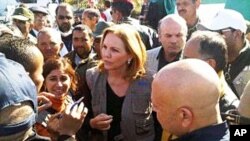Officials with the United Nations World Food Program are calling on the international community to step up action to avert a humanitarian disaster along Libya's borders.
While traveling to the Tunisian border Wednesday, WFP Executive Director Josette Sheeran called for safe humanitarian access to Libya to help those fleeing the unrest. WFP has launched a three-month emergency appeal for nearly $39 million for the effort.
On Tuesday, the United States praised the U.N. General Assembly for suspending Libya from the U.N. Human Rights Council, describing the unprecedented move as a warning to other nations who attack their own citizens.
U.S. Secretary of State Hillary Clinton said the General Assembly decision showed that "governments who turn their guns on their own people have no place" in the 47-member rights body, which is based in Geneva. She said the international community is sending an "unmistakable" message to Libya that violations of universal rights are unacceptable.
The 192-member General Assembly voted by consensus to suspend Libya from the Human Rights Council for committing "gross and systematic violations of human rights" in suppressing an uprising against autocratic leader Moammar Gadhafi. The assembly also expressed "deep concern" about the human rights situation in Libya.
Libya is the first nation to be suspended since the Council was formed in 2006. The resolution was co-sponsored by 72 nations, mainly Arab and African.
U.S.-based rights group Human Rights Watch welcomed Libya's suspension, but said it raises questions about why the General Assembly elected Tripoli to the council in the first place. Libya won a three-year term on the council last year as part of an uncontested slate of candidates nominated by African nations.
Human Rights Watch says the lack of competition in the election process virtually assures that uncontested candidates will win council seats, despite poor rights records in the case of Libya and other nations.
The action does not permanently remove Libya from the council, but prevents it from participating until the General Assembly determines whether to restore the country to full status.
U.N. Secretary-General Ban Ki-moon said suspending Libya from the council sends a strong message that those who commit crimes against humanity will be punished.


















